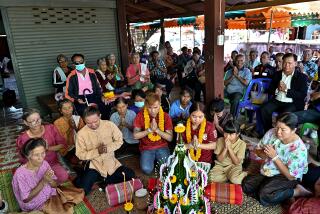COLUMN ONE : Philippine Maids Face Cruel Lives : Many who work abroad are victims of racism, abuse and slave-like conditions. Filipinos are outraged at Singapore’s execution of a worker and Manila’s lack of action.
- Share via
MANILA — An unskilled clerk from the overcrowded barrios of Manila, Rosalina chafed at earning a meager $150 a month in a large department store. So, like millions of impoverished women before her, she left behind a husband and an infant daughter and went to find her fortune in the Middle East.
Although a recruiter promised her a cashier’s job paying $500 a month, the only available work was a servant’s job for a family in Abu Dhabi.
Her dismay turned to scalding anger when she read her contract and found she would earn only $147 a month after working free for six months to pay employment agency fees and air fare.
Her predicament worsened in the ensuing months as the family locked Rosalina inside their house every time they went out. She had no days off and was forbidden to use the telephone or get letters.
“They treated me like an animal,” she recalled bitterly.
After enduring 11 months, Rosalina asked to be sent home. Instead, she was locked in a tiny cubicle. After three days, her employer’s brother crept into the room at night, held a knife to her throat and raped her. A policeman came the next day and took her to the airport.
According to government officials and charitable organizations here, Rosalina’s experience is a painfully familiar tale to the 3.4 million Filipinas working overseas, mainly as maids in the Middle East and developed Asian countries.
Driven out of their homeland by endemic unemployment and wages below subsistence level, they are frequently defrauded by employment agencies, forced to work in medieval conditions and abused by employers who use fists, whips and even pans of boiling water as punishment. There are a number of documented cases in which Philippine women had their ears and hands steam-ironed by angry bosses.
“Abuse of these women is very, very common, especially in the Middle East,” said Arnel de Guzman, a director of Kaibigan, a support group for overseas workers. “Culturally, employers often treat Filipinas as the modern-day equivalent of slaves. They use everything from verbal outbursts to extreme physical abuse such as beatings.”
Philippine women are harassed in many countries from the moment they arrive and are subjected to treatment that in many parts of the world would be considered outrageous racism.
Last year, Malaysian police rounded up 1,200 Philippine maids for immigration checks while they were receiving Communion at a Roman Catholic church in Kuala Lumpur. (All but 20 were released.)
In Hong Kong, a landlord posted a sign in his complex reading “Dogs and Filipinas must use the service elevator.” And although a new law in Hong Kong gives longtime residents the right to vote in upcoming local elections, a group of Hong Kong Chinese is demanding that Filipinos--but not Europeans--be stripped of their franchise.
Overseas domestic workers frequently face excruciating emotional burdens while far from home, absences that typically last two years but often as many as 10.
Husbands often start new relationships during the separation, and their children sometimes forget the mothers they hardly knew.
Long-simmering resentment over the predicament of Filipinas overseas finally boiled over in March after Singapore hanged a maid named Flor Contemplacion for allegedly murdering another maid and a 4-year-old boy the murdered maid cared for in an argument over luggage.
Philippine President Fidel V. Ramos had appealed to Singapore’s authorities to delay the execution and to consider new evidence in the case, but the government brushed aside the request.
Among Filipinos, the outrage was compounded when Singaporean jailers refused to allow Contemplacion to give her children a farewell hug in her prison cell.
Tens of thousands of angry Filipinos took to the streets in the Philippines to protest. Singapore’s flag was burned. A group of Singaporean tourists had to be rescued from a hotel in central Cebu and escorted to the airport after they were surrounded by gun-toting demonstrators, including the mayor.
The Contemplacion controversy erupted at a time of national elections in the Philippines and was seized upon by opposition politicians, who attacked the government for ineptitude.
Two of the most respected government officials, Foreign Affairs Secretary Roberto Romulo and Labor and Employment Secretary Maria Nieves Confesor, were forced to resign in the face of accusations that they failed to sufficiently support Contemplacion.
The controversy, which is still being hotly debated, implanted in the national psyche the issue of the abuse of overseas workers. Two movies about Contemplacion already have debuted, and a third is in production in Manila.
The Contemplacion case went virtually unnoticed until shortly before her execution. In contrast, another murder case--this one involving a Philippine maid in the United Arab Emirates--has attracted nationwide attention here, in addition to a full-scale government inquiry and the launching of a million-dollar defense fund.
The case of Sarah Balabagan is especially poignant because she is 16 years old, well below the legal age limit of 21 set by the government for Filipinos to go overseas on a work contract. Balabagan is accused of stabbing her employer repeatedly; she maintains that she acted in self-defense because he tried to rape her for the second time in a day.
Figures compiled by the Philippine Overseas Workers Welfare Administration indicate that cases of abuse are common.
The agency reported receiving more than 10,000 complaints from overseas workers last year, including 156 cases of physical mistreatment and 18 rapes in Kuwait, 32 physical abuse cases and 11 rapes in Saudi Arabia and 33 cases of mistreatment and six rapes in Oman.
“There is a perception that the Philippines’ government is not doing enough to protect its workers,” said Wilhelm D. Soriano, administrator of the Overseas Workers Welfare Administration.
Guzman of the Kaibigan group said maids working in the austere Islamic environment of the Persian Gulf countries are especially vulnerable to employers who use accusations of religious misconduct as a form of punishment. One woman was recently lashed 200 times and sentenced to 10 months in jail for being alone in a room with a male chauffeur in a country where there are crimes of “close proximity.”
“If it is the word of the employer against the domestic worker, they almost always take the employer’s side,” Guzman said of courts in the Persian Gulf.
The publicity surrounding the Contemplacion and Balabagan cases has spurred the Philippine government to take steps to protect its overseas workers, who send home about $2.5 billion each year and are seen as a linchpin in the country’s efforts to develop the economy.
Earlier this month, the Philippine Congress adopted what it called a “Magna Carta” for overseas workers; the purpose of the measure is to provide “full protection for labor” both at home and overseas. The bill tightens regulations governing recruitment of labor in the Philippines and requires workers to register with Philippine embassies overseas or face forfeiture of their passports.
Whether these new regulations will be any more stringently enforced than the old rules remains to be seen. Fully half of the Philippines’ overseas workers are considered “undocumented,” meaning they left on job contracts without properly notifying the government.
The Philippine Embassy in Kuwait recently sent home one maid who had escaped her employer and complained of mistreatment. She turned out to be 12, although her passport said she was 31.
National outrage has led to calls by influential politicians to ban the export of labor altogether, despite the serious impact that would have on the national economy.
“We should recommend to the president [Ramos] to phase out the export of domestic helpers,” especially to the Middle East, said Emilio Gancayco, a former Supreme Court justice who heads a commission investigating the conditions of overseas workers.
Sen. Ernesto F. Herrera, who sponsored the overseas workers legislation, said it gives the government a mandate to steer workers away from countries with histories of abuse.
“There are countries where there is a high incidence of violation of human rights and freedom of association,” Herrera said. “I think the government can do more than it does to protect its overseas workers.”
There are signs that growing international pressure is leading some governments to take a harder line on the abuse of maids. A Kuwaiti couple recently were sentenced to 10 years in prison for beating their Philippine maid to death. A Singaporean man and his wife were jailed and fined in April for slapping and whipping their 20-year-old maid so frequently that she risked death by lowering a beach towel from her 11th-floor balcony to escape to the floor below.
Even in Hong Kong, where salaries are among the highest in the world for Philippine maids and where they have the greatest freedom, tragedies still occur.
Last month, a maid jumped to her death from the window of her employer’s apartment when immigration officers arrived to investigate a complaint that she was moonlighting as a waitress. There are several hundred deportations of maids for accepting illegal work each year.
The Hong Kong government has gone further than any other in responding to Filipinas’ complaints about ill-treatment. After years of watching thousands of maids being harassed for congregating near a city square on Sunday mornings, it opened several school buildings so that maids in different parts of the city have a place to go on their weekly day off.
Maids dismissed by their employers have the legal right to seek employment elsewhere. They even have their own legal labor union to defend them in disputes.
“Comparatively speaking, Hong Kong is a paradise for overseas workers,” said Linda Layosa, editor of Tinig Filipino, a magazine that caters to overseas workers. “The Hong Kong government has been extremely supportive of us.”
Layosa’s own career illustrates the kind of burdens that maids face even when working conditions are good. She went to Hong Kong eight years ago because a job as a maid paid more than her sixth-grade teacher’s job at home, where she had graduated magna cum laude from a university.
Layosa said she spent six years caring for the children of a doctor’s family in Hong Kong, leaving behind her own twin girls, son and husband to earn enough to support them.
“My children were my sacrificial lambs,” she noted ruefully. “Now that I have time for them, they no longer have interest in me. I gave my children financial comfort but failed to give them what my mother gave me--my care and love. Most of us are in the same boat.”
More to Read
Sign up for Essential California
The most important California stories and recommendations in your inbox every morning.
You may occasionally receive promotional content from the Los Angeles Times.













